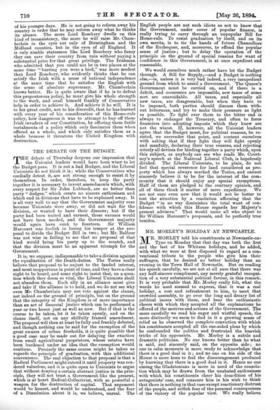THE DEBATE ON THE BUDGET. T HE debate of Thursday deepens
our impression that the Unionist leaders would have been wiser to let the Budget pass. It is not a bad Budget, and the Liberal Unionists do not think it is ; while the Conservatives who cordially detest it, are not strong enough to resist it by themselves. In order, therefore, to keep the party together it is necessary to invent amendments which, with every respect for Sir John Lubbock, are no better than party "dodges," which create no sincere enthusiasm and which end in divisions that have to be explained away. It is all very well to say that the Government majority rose because Unionists were away, or did not wait for the division, or wanted to have their dinners ; but if the party had been united and earnest, those excuses would not have been needed, and the Government majority would again have sunk to fourteen. Sir William Harcourt was foolish in losing his temper at the pro- posal to divide the Budget Bill in two ; but Mr. Balfour was not wise in failing to see that no proposal of that kind would bring his party up to the scratch, and that the division must be an apparent triumph for the Government.
It is, we suppose, indispensable to take a division against the equalisation of the Death-duties. The Tories really believe that proposal to be unjust to the landed interest, and most inopportune in point of time, and they have a clear right to be heard, and some right to insist that, on a ques- tion which they deem so vital, the Liberal Unionists shall not abandon them. Each ally in an alliance must give and take if the alliance is to hold, and we do not see why even Mr. Chamberlain may not vote against the clause, not indeed on the ground of principle, but on the ground that the integrity of the Kingdom is of more importance than an act of financial justice which can be performed a year or two hence just as well as now. But if that is the course to be taken, let it be taken openly, and on the clause itself, not on any skilfully framed amendment. The proposal will then at least be fully and frankly debated, and though nothing can be said for the exemption of the great owners of urban freeholds, it is quite possible that a good case may be made out for delaying the exaction from small agricultural proprietors, whose estates have been burdened under an idea. that the exemption would continue. Precisely the same course might be taken as regards the principle of graduation, with this additional convenience. The real objection to that proposal is that a Radical Parliament might extend it until property was ren- dered valueless, and it is quite open to Unionists to argue that without denying a certain abstract justice in the prin- ciple, they will not trust a Government like the present, which is at heart Radical-Collectivist, with so powerful a weapon for the destruction of capital. That argument would be honest, and, would be understood, and the fear of a, Dissolution about it is, we believe, unreal. The English people are not such idiots as not to know that the Government, under cover of popular finance, is really trying to carry through an unpopular Bill for Home-rule. To resist graduation by itself, and on its own merits, is to tie the hands of future Chancellors of the Exchequer, and, moreover, to offend the popular sense of justice ; but to delay the operation of the principle on the ground of special reasons for want of confidence in this Government, is at once expedient and. reasonable.
We would ourselves much rather have let the Budget through. A Bill for Supply,—and a Budget is nothing else,—is, unless it is very bad indeed, a very inexpedient ground from which to assail a Government. The Queen's Government must be carried on, and if there is a deficit, and economies are impossible, new taxes of some sort are unavoidable. All taxes, and especially all new taxes, are disagreeable, but when they have to be imposed, both parties should discuss them with- out bitterness, and try to make their pressure as light as possible. To fight over them to the bitter end is always to endanger the Treasury, and often to force financiers into adopting imposts which they know are not the wisest. If, however, all the Unionist leaders agree that the Budget must, for political reasons, be re- sisted, we surrender that point, and content ourselves with asking that if they fight they will fight openly and manfully, declaring their true reasons, and rejecting utterly all devices for binding together a party which, upon this subject, as anybody can see who reads Mr. Court- ney's speech at the National Liberal Club, is hopelessly divided. The Liberal Unionists, to be plain, do not feel that special reverence for land considered as pro- perty which has always marked the Tories, and cannot sincerely believe it to be for the interest of the com- munity that it should enjoy any special exemptions. Half of them are pledged to the contrary opinion, and all of them think it matter of mere expediency. We are not sure even now that it would not be better to test the situation by a resolution affirming that the Budget "in no way diminishes the total want of con- fidence with which this House regards her Majesty's present advisers." That would unite all who object to Sir William Harcourt's proposals, and be perfectly true besides.


































 Previous page
Previous page